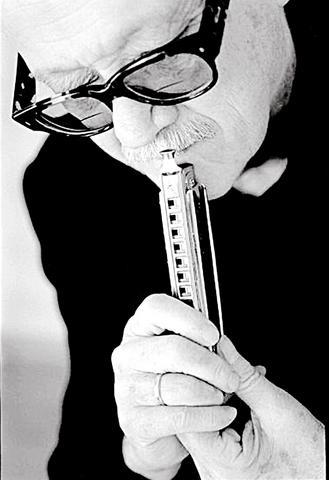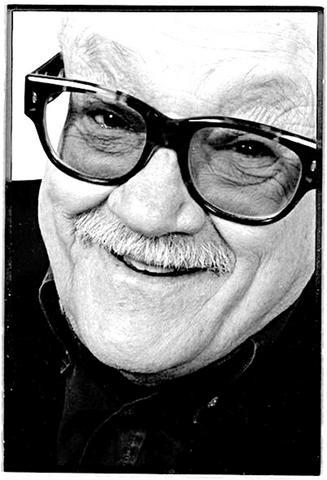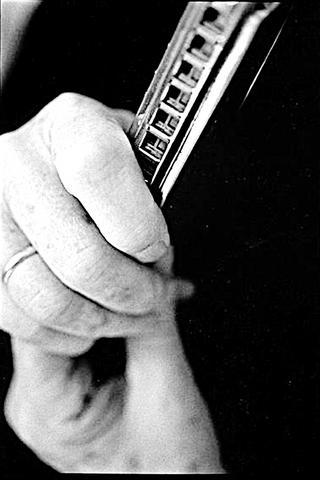Toots Thielemans is that rare musician who can be accorded the title living legend. Born in 1922, he taught himself jazz guitar by listening to a wind-up phonograph during Germany's occupation of Belgium. A decade later he was playing both the guitar and harmonica -- the instrument that he would single-handedly popularize in the jazz world -- alongside the likes of Benny Goodman, Bill Evans, Charlie Parker, Miles Davis and Quincy Jones. In 1962, his composition Blusette became an overnight jazz standard and secured him a place in the pantheon of jazz giants.
He provided the haunting harmonica solos for Midnight Cowboy and Sugarland Express as well as composed and performed the universally popular theme song to Sesame Street. Not only an accomplished guitarist and harp player, he's perhaps the only musician to have made a career out of whistling, having used it to accompany the jazz guitar and later in numerous television commercials.

PHOTO COURTESY OF CULTURAL CENTER
He's the perennial winner of Down Beat magazine's readers and critics poll in the category "miscellaneous instruments," an honor that prompted the late Clifford Brown to say "Toots, the way you play harmonica they should not call it a miscellaneous instrument." The comment stands as his favorite compliment, despite having had the world-renowned Antwerp Jazz Festival named after him.

Taipei Times spoke with Thielemans at his home in Antwerp earlier this week.
Taipei Times: Have you ever played in Taiwan before?

Thielemans: No, no, never before. I've never even visited. I've been to Japan and Hong Kong. I go regularly to the Blue Note in Japan and I was in Singapore about a month ago.
TT: You started playing the accordion at age three. How did you lift it?
Thielemans: In Europe, at sidewalk cafes, people come to drink beer. I saw an accordion player there one day and picked up a shoe box, making the motions of the accordion with that shoe box. One of the customers in the bar told my father, `Hey, your kid likes to play the accordion.' So my father bought me a cardboard accordion, one that a kid can play. It wasn't so heavy.
TT: You won your first guitar on a bet? What was the bet?
Thielemans: Well, I already played the harmonica as a hobby. And I was not bad in mathematics, but no Einstein, you know. I had started to play melodies and improvisations. And once, when I was sick with pneumonia, I had a friend come visit me. He had a lot of money because his uncle sold liquor in the black market during the war. He bought instruments every week -- a different instrument every week -- and he was disgusted because he couldn't get anything out of the guitar. He came to visit me wanting to play a Fats Waller tune that all the kids in Belgium knew -- in 1942, I'm talking, 60 years ago -- that tune Hold Tight (sings it). He wanted to play that phrase on one string and he couldn't get it. And I told him -- Gilbert was his name -- `Give me the guitar a moment and I can play that melody on one string in 10 minutes.' I had never touched the guitar before so Gilbert said, `If you can do it, you get the guitar!' So I got the guitar and started buying all the records by Django Rhinehardt and studied the guitar from the phonograph. You had to wind it up and change the needle every few minutes. I still have the phonograph.
TT: I've heard you say Django Rhinehardt was your idol.
Thielemans: Not only my idol but the idol for the whole generation. During the German occupation, we didn't have any records of American guitar players. It was only after the liberation that I started to get the American jazz records. For all the youngsters of my generation who wanted to play the guitar, Django was the role model, the guru, the whatever you want to call it. But after a couple of years I became taken with the mainstream of American jazz.
TT: I know you as the man who played the theme song on Sesame Street.
Thielemans: (laughs) I think we should play that song in Taiwan. Do people there know it?
TT: I think everyone knows that song.
Thielemans: Yeah, we can play that. That theme, they still use it in some parts of the world, I think. That was a one-hour job for me. I made US$37 to do that and they attached it to all the shows (hums part of the tune). That was during the late 1960s or 1970s, I think. During that time I also did the music to Midnight Cowboy.
TT: And Sugarland Express, yes?
Thielemans: Yes. That was one of the first movies by Steven Spielberg, I think. It was his first collaboration with the composer John Williams. John was a fan of mine (laughs) and he asked me to come to Los Angeles to help with the movie.
TT: You're one of the few musicians to have made a career not only from playing the harmonica, but from whistling as well.
Thielemans: Well, it's a shame I cannot whistle anymore. I have trouble with the nerve in my inner ear. It prevents me from hearing the proper pitch, but not with the harmonica fortunately. But I did enjoy that very much, playing the guitar and whistling.
TT: What advice would you have for a budding whistler?
Thielemans: (laughs) Many, many people whistle much better than I do.
TT: What's thus far been your most memorable experience working with many the musicians you've played with? Has there been a highlight?
Thielemans: Oh, I have so many. One strong memory was working with Bill Evans. That is not easily forgotten. ? Some of the concerts I've played with Quincy Jones. I was in the States -- I'm talking 1953 maybe -- I played with Charlie Parker's All Stars and with Miles Davis. And there was little old me on the guitar and the harmonica.
TT: So it wasn't Sesame Street.
Thielemans: (laughs) That was good, too.
TT: One last question: What are your future plans?
Thielemans: Well, I play later today, and then again tomorrow.
Toots Thielemans will play with the Mike del Ferro Trio as part of the ongoing Jazz from J to Z Party at the National Concert Hall. Mike del Ferro also plays tomorrow evening before being joined by Toots the following night. Both concerts begin at 7:30pm. Tickets for tomorrow night's performance range from NT$400 to NT$2,000 while tickets for Toot's performance are priced to NT$3,000 for the very special event. Contact the National Concert Hall at (02) 2343-1587 or (02) 2343-1647 to purchase tickets, or on the Internet at http://ticket.acer121.com.

Behind a car repair business on a nondescript Thai street are the cherished pets of a rising TikTok animal influencer: two lions and a 200-kilogram lion-tiger hybrid called “Big George.” Lion ownership is legal in Thailand, and Tharnuwarht Plengkemratch is an enthusiastic advocate, posting updates on his feline companions to nearly three million followers. “They’re playful and affectionate, just like dogs or cats,” he said from inside their cage complex at his home in the northern city of Chiang Mai. Thailand’s captive lion population has exploded in recent years, with nearly 500 registered in zoos, breeding farms, petting cafes and homes. Experts warn the

The unexpected collapse of the recall campaigns is being viewed through many lenses, most of them skewed and self-absorbed. The international media unsurprisingly focuses on what they perceive as the message that Taiwanese voters were sending in the failure of the mass recall, especially to China, the US and to friendly Western nations. This made some sense prior to early last month. One of the main arguments used by recall campaigners for recalling Chinese Nationalist Party (KMT) lawmakers was that they were too pro-China, and by extension not to be trusted with defending the nation. Also by extension, that argument could be

Aug. 4 to Aug. 10 When Coca-Cola finally pushed its way into Taiwan’s market in 1968, it allegedly vowed to wipe out its major domestic rival Hey Song within five years. But Hey Song, which began as a manual operation in a family cow shed in 1925, had proven its resilience, surviving numerous setbacks — including the loss of autonomy and nearly all its assets due to the Japanese colonial government’s wartime economic policy. By the 1960s, Hey Song had risen to the top of Taiwan’s beverage industry. This success was driven not only by president Chang Wen-chi’s

Last week, on the heels of the recall election that turned out so badly for Taiwan, came the news that US President Donald Trump had blocked the transit of President William Lai (賴清德) through the US on his way to Latin America. A few days later the international media reported that in June a scheduled visit by Minister of National Defense Wellington Koo (顧立雄) for high level meetings was canceled by the US after China’s President Xi Jinping (習近平) asked Trump to curb US engagement with Taiwan during a June phone call. The cancellation of Lai’s transit was a gaudy